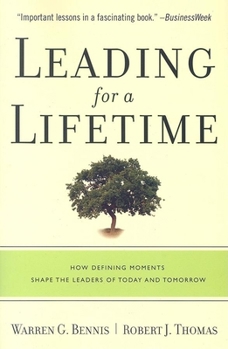Leading for a Lifetime: How Defining Moments Shape Leaders of Today and Tomorrow
Select Format
Select Condition 
Book Overview
Today's young leaders grew up in the glow of television and computers; the leaders of their grandparents' generation in the shadow of the Depression and World War II. In Leading for a Lifetime, Warren Bennis and Robert Thomas set to find out how era and values shape those who lead. At the heart of this model are what the authors call crucibles - utterly transforming periods of testing from which one can emerge either hopelessly broken or powerfully emboldened to learn and to lead. Whether losing an election or burying a child, learning from a mentor or mastering a martial art, crucibles force us to decide who we are and what we are capable of.
Format:Paperback
Language:English
ISBN:1422102815
ISBN13:9781422102817
Release Date:June 2007
Publisher:Harvard Business Review Press
Length:224 Pages
Weight:0.50 lbs.
Dimensions:0.7" x 5.5" x 8.2"
Customer Reviews
2 ratings
Great advice from great leaders, young and old
Published by Thriftbooks.com User , 17 years ago
"What doesn't kill you makes you stronger," is one of Friedrich Nietzsche's most famous sayings. In their quest to uncover the secrets of great leadership across generations, Warren Bennis and Robert J. Thomas arrive basically at the same conclusion in this revised update of their earlier book Geeks & Geezers. The ability to overcome adversity is the universal theme that emerges from their interviews with 18 "geeks," leaders mostly younger than 30, and 25 "geezers," leaders mostly aged 70 to 80, in search of lessons about leadership, as shaped by generational differences. How disparate and how alike were the corporate leaders of the World War II generation and today? Though raised in radically different generations, both groups share unflinching optimism, rock-solid integrity and the ability to inspire others. We strongly recommend the leadership principles in this finely crafted, absorbing book to leaders and potential leaders. Look at it this way: The effort won't kill you; in fact, it'll probably make you stronger.
"Crucibles" That Create Exceptional Leaders of All Ages
Published by Thriftbooks.com User , 17 years ago
Note: This is a revised and updated reissue of Warren G. Bennis and Robert J. Thomas' previously published Geeks & Geezers. The review that follows is of that book whose insights are essentially the same in the reissue. I have read all and reviewed most of the books which Bennis has authored or co-authored. My opinion is that this is the most thought-provoking as yet produced by the self-styled "geezer" and his co-author, Thomas. In From Good to Great, Jim Collins explains that he and his 21 research associates set out to answer these questions: Is it possible for a good, mediocre or even terrible organization to become great? If so, what are the underlying variables that enable it to do so? If not, why not?. "We came to think of our research effort as akin to looking inside a black box. Each step along the way was like installing another lightbulb to shed light on the inner workings of the good-to-great process." Similarly, what we have here is Bennis and Thomas' response to another question: "Why are some people able to extract wisdom from experience, however harsh, and others are not?" Bennis and Thomas asked successful geeks to share the secrets of their youthful triumphs and distinguished geezers to tell them how they continue to stay active and engaged despite the changes wrought by age. They selected and then interviewed a group of 43 effective leaders, ranging in age from 21 to 93. Their research also included others who were not interviewed. As many as possible of the interviews were videotaped because Bennis and Thomas knew that "taping would preserve a wealth of information that no transcript could capture.". The results of their study are presented and discussed in this book. It would be a disservice to them as well as to those who read this review to summarize all of the conclusions they reached. Among the findings of their research, Bennis and Thomas learned that Geezers and Geeks had quite different concerns when in the age range of 25-30. The Geezers' concerns were making a living, earning a good salary, starting and supporting a family, stability and security, working hard and getting rewarded by the system, listening to their elders, paying "dues" to various organizations, and using retirement to enjoy life. In contrast, Geeks' concerns (during the same age range) were making history, achieving personal wealth, launching a career, change and impermamence, working hard so they can write their own rules, wondering if their elders "got it wrong," deciding where loyalty should lie, and achieving a balance between work and life. These are significant differences which Bennis and Thomas explain in terms of the different eras in which Geeks lived (at ages 25-30), the societal values of their respective generations, and various "defining moments" such as those associated with the Great Depression, World War Two as well as Viet Nam and the emergence of the Internet and World Wide Web. Of special interest to me is Bennis and Thomas






